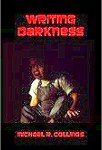
Michael R. Collings
CreateSpace
Paperback $10.99, eBook $3.99
ISBN-13: 978-1479384044
186pp. 2012
Review by Andrew Byers
This is a book all writers, especially those who write horror fiction, should read. Its author, Michael R. Collings, is a retired professor of creative writing and literature at Pepperdine University. He’s a writer – of horror, mysteries, and science fiction, among other genres – and a literary scholar, but he also taught creative writing for decades. He knows what he’s talking about here. The rest of us would be well-served to listen to what he has to say about writing.
Writing Darkness is a book in two (linked) parts: the first section is a series of Collings’ essays on horror as literature and genre. The essays are interesting and insightful reflections – sometimes self-reflections – from a man who has been reading horror fiction, writing about it critically as a literary scholar, and writing his own horror fiction for most of his life. Any serious fan of the genre would enjoy these useful and thought-provoking essays.
As a fan and occasional author of horror fiction, I am already planning to revisit these essays as I continue to think about the genre. The second, and larger, section of the book is another set of essays on the building blocks of writing: things such as word choice; the nitty gritty of grammar that many of us need a refresher course on; speech tags; sentence structure; and dialogue construction, among other topics. All the basics for writers, but it’s material that we all need to hear. These are the dos and don’ts that most of us learned at some point, but most of us have forgotten. And not to worry, Collings also tells us when it’s safe to ignore these rules for the betterment of our writing. Collings provides us the simple, clear, pragmatic foundations we need for constructing the prose needed to effectively tell our tales of horror.
If there’s a weakness present in Writing Darkness, it’s just that I would have liked to have read more of Collings’ essays on the horror genre and horror literature in general. Sure, the first half of Writing Darkness covers this, but the essays included are sufficiently interesting and thought-provoking that I wanted much more. I can only hope that Collings will pen a second volume of his thoughts on the genre.
And one small aside: when I first picked up Writing Darkness, the cover confused me. As you can see, it depicts a small boy crying, clearly terrified by something not shown in the image. A bit of an odd cover, I thought. Then I read the first essay in the collection. I’m not going to spoil the origins of that cover, but I have to say that now I love the cover – it is an absolutely perfect choice for this collection.
I don’t think it’s an exaggeration to say that spending a few measly bucks on Writing Darkness – if one reads and internalizes Collings’ guidance – is a better value than paying hundreds of dollars for an equivalent creative writing college course. Recommended for all writers reading this review.









Trackbacks/Pingbacks